|
|
|
Sort Order |
|
|
|
Items / Page
|
|
|
|
|
|
|
| Srl | Item |
| 1 |
ID:
187665
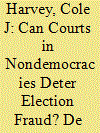

|
|
|
|
|
| Summary/Abstract |
Many nondemocracies hold multiparty elections while also adopting institutions of de jure judicial independence; yet there is debate over how nondemocratic courts can affect election integrity. This paper argues that increased de jure independence creates incentives for opposition recourse to the courts, which reduces election fraud due to greater legal exposure for election-manipulating agents and the ruling party. However, this effect occurs only when competition is low and the ruling party has limited incentive to intervene. These predictions are distinct from those of prior work, and they are supported by an analysis of cross-national election-year data from 1945 to 2014. Preprocessing techniques are used to reduce concerns about endogeneity and confounding. The results show that principal-agent dynamics can occur in manipulated elections even when incumbents remain in office, challenge the centrality of protest risk as a deterrent to manipulation, and offer a framework for predicting when de jure reforms translate to behavioral independence.
|
|
|
|
|
|
|
|
|
|
|
|
|
|
|
|
| 2 |
ID:
187668


|
|
|
|
|
| Summary/Abstract |
When individuals evaluate policies, they consider both the policy’s content and its endorsers. In this study, we investigate the conditions under which these sometimes competing factors guide preferences. In an effort to combat the spread of COVID-19, American President Trump and Canadian Prime Minister Trudeau bilaterally agreed to close their shared border to refugee claimants and asylum seekers. These ideologically opposed leaders endorsing a common policy allows us to test the influence of a well-known foreign neighbor on domestic policy evaluations. With a large cross-national survey experiment, we first find that Canadians and Americans follow ideological positions in evaluating the policy, with right-leaning respondents offering the most support. With an experiment, we reveal how both populations shift their views when told about their neighboring leader’s endorsement. Our findings highlight ideologically motivated reasoning across an international border, with broad implications for understanding how individuals weigh a policy’s content against its political cues.
|
|
|
|
|
|
|
|
|
|
|
|
|
|
|
|
| 3 |
ID:
187656
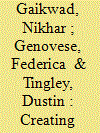

|
|
|
|
|
| Summary/Abstract |
Combating climate change requires large economic adjustments with significant distributional implications. To build coalitions of support, scholars and policy makers propose compensating individuals who will bear decarbonization’s costs. What are the determinants of public opinion regarding climate compensation and investment? We theorize that climate policy vulnerability and climate change vulnerability induce support for distinct types of climate policy. Fielding original surveys in the United States and India, we show that people who reside in coal-producing regions prefer compensation for lost jobs. The general public privileges diffuse redistribution mechanisms and investments, discounting compensation to targeted groups. Those who are both physically and economically vulnerable have cross-cutting preferences. Nevertheless, there is considerable support across our samples for policies that compensate different coalitions of climate-vulnerable citizens, in line with theories of “just energy” transition and embedded liberalism. We trace the distinctive compensatory preferences of fossil fuel communities to a logic of shared community identities.
|
|
|
|
|
|
|
|
|
|
|
|
|
|
|
|
| 4 |
ID:
187666


|
|
|
|
|
| Summary/Abstract |
Postindustrial occupational change has ended an era of unprecedented upward mobility. We examine the political implications of this immense structural shift by introducing the concept of status discordance, which we operationalize as the difference between status expectations formed during childhood and outcomes realized in adulthood. We leverage German household panel data and predictive modeling to provide empirical estimates of status expectations based on childhood circumstances and parental background. The analysis reveals that political dissatisfaction is widespread among voters who fall short of intergenerational status expectations. We show that such dissatisfaction is associated with higher abstention rates, less mainstream party support, and more radical voting. Moreover, we explore variation in status discordance by gender, education, and occupation, which influence the choice between radical left and right parties. Our findings highlight how expectations about opportunities underlie generational voting patterns and shed light on the ongoing breakdown of the postwar political consensus.
|
|
|
|
|
|
|
|
|
|
|
|
|
|
|
|
| 5 |
ID:
187672


|
|
|
|
|
| Summary/Abstract |
Concerned with poor service delivery, a large literature studies accountability of politicians to voters. This article instead considers accountability relationships within governments—the ability of politicians to implement policies by holding bureaucrats responsible for their actions. In collaboration with the Ugandan government, I conducted a field experiment across 260 local governments. The objective of the reform was to empower local politicians to exercise closer oversight over the bureaucracy through training and the dissemination of financial information. Lowered oversight costs increase politicians’ monitoring effort and the quality of services, but only in areas where the political leadership is not aligned with the dominant party. In areas under ruling-party control, politicians fear uncovering mismanagement of funds. In contrast to scholars arguing that insulating bureaucrats allows them to do their jobs more effectively, these findings imply that increased political oversight can improve government responsiveness in settings with a modicum of party competition.
|
|
|
|
|
|
|
|
|
|
|
|
|
|
|
|
| 6 |
ID:
187669


|
|
|
|
|
| Summary/Abstract |
When individuals receive benefits from government programs, does it affect their attitudes toward those programs or toward government generally? A growing literature blends policy feedback theory and political behavior research to explore these questions, but so far it has focused almost exclusively on social policies such as the Affordable Care Act. In this article, we focus on a very different set of government programs that reach a more conservative, rural population: agricultural assistance. Our study ties administrative records on participation in USDA farm aid programs to an original, first-of-its-kind survey measuring agricultural producers’ political attitudes. We find that receiving agricultural assistance is sometimes related to producers’ views of the program delivering the benefits, but it depends on the divisiveness of the program and—for highly partisan programs—recipients’ ideology. However, receiving federal agricultural assistance is not associated with more positive views of government.
|
|
|
|
|
|
|
|
|
|
|
|
|
|
|
|
| 7 |
ID:
187660


|
|
|
|
|
| Summary/Abstract |
Why do modern states regulate and provide mass education? This article proposes a theory of education as a state-building tool that is deployed when mass violence threatens the state’s viability. Experiencing mass violence can heighten national elites’ anxiety about the masses’ moral character and raise concerns about the efficacy of repression or concessions alone to maintain social order. In this context, a mass education system designed to teach obedience can become an attractive policy tool to prevent future rebellion and promote long-term order. Consistent with the theory, I detect a cross-national pattern of primary education expansion following civil wars in Europe and Latin America. In a complementary study of the 1859 Chilean civil war, I show that the central government responded by expanding primary schooling in rebel provinces not as a concession but to teach obedience and respect for authority. The theory helps explain why nondemocracies often expanded mass education.
|
|
|
|
|
|
|
|
|
|
|
|
|
|
|
|
| 8 |
ID:
187663
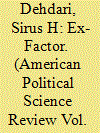

|
|
|
|
|
| Summary/Abstract |
The absence of a gendered analysis of the effect of marriage on voting is surprising given researchers’ cognizance of the heterogeneous effects of marriage on a range of other social outcomes. In this paper, we shed new light on spousal dependency by studying the gendered effect of marital disruption, in the form of divorce, on voter turnout. First, drawing on Swedish populationwide data, we use the differential timing of divorces in relation to general elections to generate more credible estimates of the causal effect of divorce on turnout. Second, although we find that both sexes are adversely affected by divorce, we show that the effect is much more pronounced for men. Specifically, the long-term effect is almost twice as large for men. Finally, we use these data to show that the gendered effect of divorce is mainly driven by asymmetrical spousal mobilization due to higher levels of turnout among women.
|
|
|
|
|
|
|
|
|
|
|
|
|
|
|
|
| 9 |
ID:
187662


|
|
|
|
|
| Summary/Abstract |
This article develops an account of demand-making and provides a novel framework for evaluating the demands and strategies of social movements. It explores three features of demands, arguing that they disclose social conditions, create constituencies, and set the horizons of the world that social movements seek to build. It does so by considering two feminist demands: the demand for wages for housework and for the socialization of housework. By revisiting revolutionary feminism in the 1970s, it contrasts two strategic perspectives articulated in debates about housework: what Selma James called the “perspective of winning” and what I call the “perspective of investment,” a strategy for change that sees short-term reforms as investments in long-term transformations. In light of this, I endorse the demand to socialize housework as apt for the contemporary care economy and show how my account of demand-making contributes to the political theory of social movements by clarifying movement demands for “non-reformist reforms,” such as defund the police.
|
|
|
|
|
|
|
|
|
|
|
|
|
|
|
|
| 10 |
ID:
187673


|
|
|
|
|
| Summary/Abstract |
Whether international crises end in conflict frequently depends on the information that leaders possess. To better explain how leaders acquire information, I develop and test an informational theory of bureaucracies during crises. Time-constrained leaders delegate information collection to advisers who lead bureaucracies. A division of labor between bureaucracies breeds comparative specialization among advisers. Some emphasize information on adversaries’ political attributes, which are harder to assess; others stress military attributes, which are easier to assess. Bureaucratic role thus affects the content and uncertainty that advisers provide. I use automated and qualitative coding to measure adviser input in 5,400 texts from US Cold War crises. As hypothesized, advisers’ positions affect the information and uncertainty they convey but not the policies they promote as canonical theories suggest. For individuals advising leaders during crises, what you know depends on where you sit. Consequently, the information leaders possess hinges on which bureaucracies have their attention.
|
|
|
|
|
|
|
|
|
|
|
|
|
|
|
|
| 11 |
ID:
187664


|
|
|
|
|
| Summary/Abstract |
After the Civil War, congressional Republicans used sweeping powers to expand and enforce civil rights for African Americans. Though the electoral benefits of African American suffrage were clear, Republicans had to overcome party divisions and racist voters. This paper argues that the war imbued Northern veterans with the belief that true victory required renewing the Union by abolishing slavery and establishing (imperfect) legal equality. This made veterans more receptive to Radical Reconstruction and ignited activism for it from below. Using difference-in-differences, I show that greater enlistment increased Republican vote share, particularly in pivotal postwar elections. Moreover, “as-if” random exposure to combat deaths increased Republican partisanship among soldiers after the war. Finally, I show that veterans became more likely to vote for African American suffrage. The paper concludes that Union veterans, through their votes and their activism, were a decisive part of the white coalition that backed America’s “Second Revolution.”
|
|
|
|
|
|
|
|
|
|
|
|
|
|
|
|
| 12 |
ID:
187659


|
|
|
|
|
| Summary/Abstract |
Why do some armed groups kidnap for ransom? Despite a dramatic spike in kidnappings by political groups over the last several decades, there are scant existing explanations for why groups use this tool of coercion. Leveraging evidence from extensive interviews with former combatants from Colombia’s civil war, including the Revolutionary Armed Forces of Colombia (FARC) and National Liberation Army (ELN), as well as military and security personnel, I show that ransom kidnapping is used to enforce groups’ protection rackets, their main source of funding. Kidnapping is both the most lucrative way to punish tax evasion and an effective means of deterring future shirking. Thus, groups that tax local populations are more likely to kidnap; groups relying on external or voluntary forms of funding are less likely to take hostages. This article explains when we should see kidnapping in armed conflict, describing an underexplored way that selective violence bolsters insurgency.
|
|
|
|
|
|
|
|
|
|
|
|
|
|
|
|
| 13 |
ID:
187657
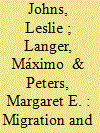

|
|
|
|
|
| Summary/Abstract |
Domestic courts sometimes prosecute foreign nationals for severe crimes—like crimes against humanity, genocide, torture, and war crimes—committed on foreign territory against foreign nationals. We argue that migrants can serve as agents of transnational justice. When migrants move across borders, as both economic migrants and refugees, they often pressure local governments to conduct criminal investigations and trials for crimes that occurred in their sending state. We also examine the effect of explanatory variables that have been identified by prior scholars, including the magnitude of atrocities in the sending state, the responsiveness of the receiving state to political pressure, and the various economic and political costs of prosecutions. We test our argument using the first multivariate statistical analysis of universal jurisdiction cases, focusing on multiple stages of prosecutions. We conclude that transnational justice is a justice remittance in which migrants provide accountability and remedies for crimes in their sending states.
|
|
|
|
|
|
|
|
|
|
|
|
|
|
|
|
| 14 |
ID:
187658
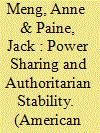

|
|
|
|
|
| Summary/Abstract |
Regimes founded in rebellion are, typically, extremely durable. We propose that this stability is founded upon peaceful power sharing between the rebel regime leader and military elites. Amid long and intense fighting, rebel leaders must delegate control to top military commanders because doing so helps them to win battles. After seizing power, power-sharing deals between former combatants are highly credible due to their history of interactions, which mitigates the guardianship dilemma. Elsewhere, a persistent internal security dilemma often undermines power-sharing deals. Using originally collected data on African regimes from 1960 to 2017, we establish that rebel regimes break down seldomly compared with other authoritarian regimes and they experience fewer coups. Regarding the mechanism, rebel regimes more frequently share power with military elites by appointing a Minister of Defense. These Ministers are typically high-ranking members of the rebellion, which reflects the regime’s replacement of the state military with their own.
|
|
|
|
|
|
|
|
|
|
|
|
|
|
|
|
| 15 |
ID:
187661


|
|
|
|
|
| Summary/Abstract |
How can states prevent armed groups from exploiting local governance gaps to (re)establish territorial control during transitions to national peace? We report results from an experimental evaluation of Colombia’s ComunPaz program, a scalable, inexpensive intervention that sought to replace rebel governance by harnessing complementarities between state and communal authorities and by improving security and justice provision in areas once dominated by FARC, the country’s largest rebel group. We find that ComunPaz enhanced the quality of local dispute resolution, increased citizens’ trust in (some) state institutions, and strengthened coordination between state and communal authorities. It also appears to have reduced citizens’ trust in, and reliance on, armed groups. The program did not, however, increase reliance on either state or communal authorities to resolve disputes, nor did it increase citizens’ trust in communal institutions. We discuss the implications of our findings for peace-building and state-building in countries transitioning from civil war.
|
|
|
|
|
|
|
|
|
|
|
|
|
|
|
|
| 16 |
ID:
187671
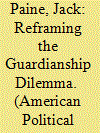

|
|
|
|
|
| Summary/Abstract |
Dictators confront a guardianship dilemma: military agents are needed to defeat mass outsider movements, but these agents can overthrow the ruler from within. In existing theories, rulers prioritize coup-proofing measures unless they anticipate strong outsider threats. Then dictators prioritize military competence. I reframe the guardianship dilemma around the central idea that militaries can choose between dual disloyalty options. In addition to staging a coup, militaries can defect by not fending off popular uprisings or rebellions. Dictators fear competent militaries not primarily because of their coup threat but instead because they often survive intact following a regime transition. Low motivation for competent militaries to save the ruler undermines their rationale of guarding against outsider threats, even if they pose a low coup threat. Consequently, rulers prioritize competence under narrow circumstances. Only radically oriented outsider movements that pose an existential threat to all regime elites induce loyalty from a competent military.
|
|
|
|
|
|
|
|
|
|
|
|
|
|
|
|
| 17 |
ID:
187676


|
|
|
|
|
| Summary/Abstract |
In this article, I show that Richard Rorty’s unduly neglected normative political theory advances a far more distinct and demanding form of liberalism than is usually attributed to him. Attention to how Rorty understands solidarity—and its corresponding conception of public obligations—encourages analysis of his nonjuridical vision of liberal community. Through examination of his oft-ignored, revealing interpretation of Vladimir Nabokov and instructive comparison with the thought of Judith Shklar, I argue that, for Rorty, the sustainability of a liberal community requires an ethos of curiosity, whereby citizens feel moved to uncover and understand the personal experiences of cruelty and humiliation endured by others. We can make sense of this ethos and its demands of us through rethinking the idea of political conversation. This understanding of Rorty’s intellectual project not only enriches our appreciation of his complex political theory but also contests the meaning and implications of liberalism itself.
|
|
|
|
|
|
|
|
|
|
|
|
|
|
|
|
| 18 |
ID:
187670


|
|
|
|
|
| Summary/Abstract |
We present novel evidence that attitudes toward nonpartisan social groups structure political belief systems. First, we show that most Americans have a rich knowledge of the social groups that support and oppose group-related policies. This knowledge often exceeds people’s awareness of where Democrats and Republicans stand on these same issues. Then, we show that this knowledge promotes what Philip Converse called ideological coherence: Americans who know which groups support and oppose a policy are more likely to hold stable policy positions over time and to organize their attitudes into consistently liberal or conservative bundles. In the twentieth century, knowledge of social groups’ issue positions rivaled knowledge of parties’ positions in its ability to generate attitude stability and constraint. However, as party identification has strengthened in recent decades, knowledge of parties’ positions has become the most important source of structure in most Americans’ belief systems.
|
|
|
|
|
|
|
|
|
|
|
|
|
|
|
|
| 19 |
ID:
187675


|
|
|
|
|
| Summary/Abstract |
Contemporary analyses of Athenian democracy have focused on binaries such as mass/elite, free/slave, and male/female, overlooking the urban/rural divide. In this article, I argue that urban/rural was a central cleavage in the Athenian demos. Ancient thinkers including Thucydides, Aristophanes, Plato, Xenophon, and Aristotle paid close attention to urban/rural differences and their consequences during the fifth century. Plato and Aristotle in particular developed sophisticated institutions and strategies to mitigate urban/rural divisions. Attending to the Athenian urban/rural divide deepens our understanding of the demos and highlights the importance of attachments to place, home, and customary ways of life for democratic stability.
|
|
|
|
|
|
|
|
|
|
|
|
|
|
|
|
| 20 |
ID:
187667


|
|
|
|
|
| Summary/Abstract |
Scholars frequently expect parties to act strategically in parliament, hoping to affect their electoral fortunes. Voters assumingly assess parties by their activity and vote accordingly. However, the retrospective voting literature looks mostly at the government’s outcomes, leaving the opposition understudied. We argue that, for opposition parties, legislative voting constitutes an effective vote-seeking activity as a signaling tool of their attitude toward the government. We suggest that conflictual voting behavior affects voters through two mechanisms: as a signal of opposition valence and as means of ideological differentiation from the government. We present both aggregate- and individual-level analyses, leveraging a dataset of 169 party observations from 10 democracies and linking it to the CSES survey data of 27,371 respondents. The findings provide support for the existence of both mechanisms. Parliamentary conflict on legislative votes has a general positive effect on opposition parties’ electoral performance, conditional on systemic and party-specific factors.
|
|
|
|
|
|
|
|
|
|
|
|
|
|
|
|
|
|
|
|
|